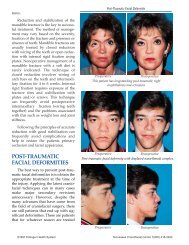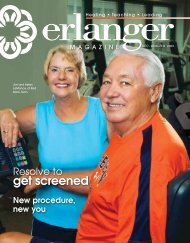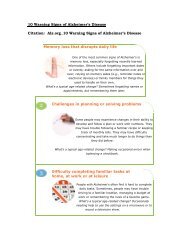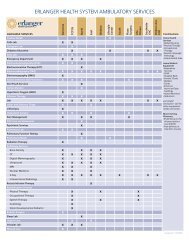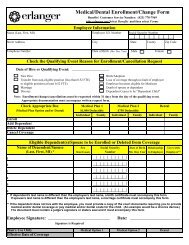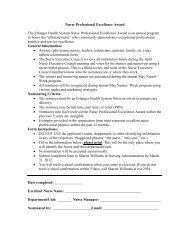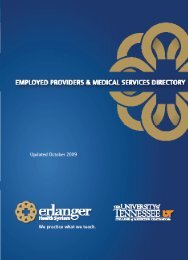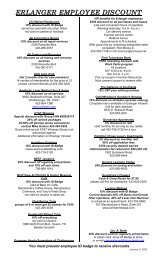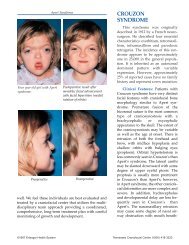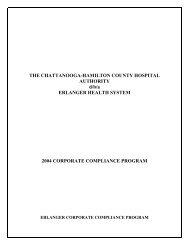Treacher Collins Syndrome - Erlanger Health System
Treacher Collins Syndrome - Erlanger Health System
Treacher Collins Syndrome - Erlanger Health System
Create successful ePaper yourself
Turn your PDF publications into a flip-book with our unique Google optimized e-Paper software.
TREACHER COLLINS<br />
SYNDROME<br />
<strong>Treacher</strong> <strong>Collins</strong> syndrome (also<br />
called mandibulofacial dysostosis<br />
and Franceschetti <strong>Syndrome</strong>) is a<br />
highly complex disease process. The<br />
basic etiology is unknown, but it is<br />
generally thought to be inherited as<br />
an autosomal dominant trait with<br />
variable penetrance. It is characterized<br />
by hypoplasia of the facial bones,<br />
especially the zygoma and the<br />
mandible. Facial clefting causes this<br />
hypoplastic appearance, with possible<br />
deformities or deficiencies of the<br />
ear, orbital, midface, and lower jaw<br />
regions. The clinical appearance is a<br />
result of the zygoma (malar bone)<br />
failing to fuse with the maxilla,<br />
frontal, and temporal bones. Highly<br />
variant degrees of involvement (complete,<br />
incomplete, and abortive<br />
forms) can be seen, but common<br />
facial features may include:<br />
(1) Hypoplastic cheeks, zygomatic<br />
arches, and mandible;<br />
(2) Microtia with possible hearing<br />
loss;<br />
(3) High arched or cleft palate;<br />
(4) Macrostomia (abnormally<br />
large mouth);<br />
(5) Anti-mongoloid slant to the eyes;<br />
(6) Colobomas;<br />
(7) Increased anterior facial height;<br />
(8) Malocclusion (anterior open bite);<br />
(9) Small oral cavity and airway with<br />
a normal-sized tongue;<br />
(10) Pointed nasal prominence.<br />
Preoperative<br />
<strong>Treacher</strong> <strong>Collins</strong> <strong>Syndrome</strong><br />
Severe mandibular hypoplasia in the patient with<br />
<strong>Treacher</strong> <strong>Collins</strong> syndrome.<br />
Preoperative<br />
Postoperative<br />
Postoperative<br />
Postoperative result after mandibular reconstruction and chin<br />
advancement to correct malocclusion and improve profile.<br />
The craniofacial team’s geneticist<br />
should evaluate all <strong>Treacher</strong> <strong>Collins</strong><br />
©1997 <strong>Erlanger</strong> <strong>Health</strong> <strong>System</strong> Tennessee Craniofacial Center 1(800) 418-3223



